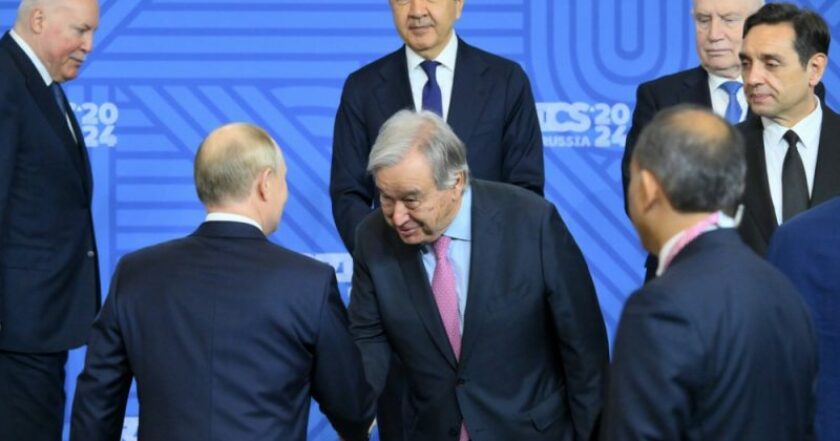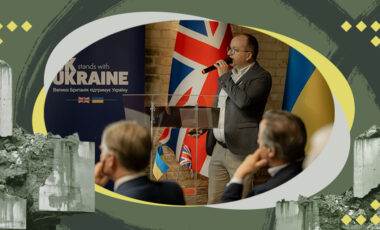BRICS, UN, Russian Federation — WTF? Curiosities and Threats of the Kazan Summit

Фото: EPA/EFE
Queen Penelope from Homer's "Odyssey" endured the final stretch of her husband's 20-year absence, surrounded by suitors who feasted and pressured her to choose one of them for marriage. The conclusion of this courtship was unexpected for everyone involved. The recent BRICS summit mirrors these epic events, but in a reversed manner: Russia, playing the role of Penelope, gathers a crowd of eager participants while trying to project an image of having no alternatives. She even permitted the slaughter of "whole flocks of sheep and slow-moving oxen" (serving guests dumplings with sturgeon and stewed leg of lamb) to showcase the wealth of her "kingdom" and demonstrate that her affection is worth pursuing. This is how the summit is meant to be perceived by the West: Putin is the leader, Russia is not isolated, its allies are united purely out of "friendship," and the "global south" is gaining influence. However, none of this is true.
Mosquito banking and the anti-Western coalition
BRICS, as envisioned by Russia and its primary stakeholder—China—should evolve into a political bloc and a counterbalance to the West. However, the economic aspect holds significantly more weight for others, forcing Beijing and Moscow to accept this reality. If we view economy and politics as base and superstructure, it becomes clear that demonstrating economic power should validate political power. For both, ongoing political strategies equate to warfare: China seeks global dominance through trade expansion while flexing its military muscle in the South China Sea. In contrast, Russia has attacked Ukraine and is attempting to win over the rest of the world with bribes. Yet, the Kremlin's claims of boundless resources and capabilities are largely a product of propaganda; in reality, these resources are gradually depleting, akin to dwindling stocks of Soviet-era weapons and military equipment. With little time to translate economic influence into political leverage, the Kremlin resorts to desperate measures.
Putin's first meeting at the summit with Dilma Rousseff, head of the BRICS New Development Bank, was no coincidence. Rousseff described the summit as a very important event, a sentiment echoed by Russian media headlines. However, her statement essentially conveyed that "the countries of the global south need financing, without which their sustainable development is impossible." For these nations, BRICS serves primarily as a means to attract funds, which are challenging to secure. This pragmatic view underscores that participation in the organization does not require concessions in sovereignty regarding domestic or foreign policy.
The paradox of Russia's position is that it simultaneously offers to "bank" together and unite against the West, while not being able to accept a refusal because it lacks alternatives. Even self-interested motivations from partners are significant for Russia, as they reinforce its perceived status as a "support" for these countries. This is why Putin brought key figures from Russia's war economy to the meeting with Rousseff, including Central Bank head Elvira Nabiullina, Deputy Prime Minister Oleksii Overchuk, Foreign Minister Sergei Lavrov, his assistant Yurii Ushakov, and Finance Minister Anton Siluanov. Their involvement is not accidental.
The Kremlin has long considered creating a separate payment system within BRICS as an alternative to SWIFT. Officially, this is framed as a response to the "fair demands of the multi-billion-dollar sub-sanctioned market." However, it reflects Russia's urgent need for a more reliable currency to finance its imperial ambitions. Thus, a primary focus of the summit in Kazan is the launch of the BRICS Bridge payment system. The name directly references the MBridge platform, where China is promoting the digital yuan alongside Hong Kong, Thailand, the UAE, and Saudi Arabia—an initiative that Russian media has heralded as a "tremendous success" for the past two years. The Kremlin envisions this system as a network of small banks in BRICS countries that can conduct transactions in local currencies for mutual trade in "oil, natural gas, grain, and gold," creating a "mosquito fleet" for international settlements.
Despite these ambitious plans to establish a new world order free from Western hegemony and the dominance of the American dollar, the summit's outcomes were far more modest. No one was willing to openly support Russia's opposition to Western dominance, and the hosts underscored the illusory nature of dedollarization by advising guests to prepare cash in dollars or euros, as Mastercard and Visa cards are not accepted in Russia. While discussions on digital money, blockchain, and other advanced topics were prevalent, Putin notably showcased a bill printed on a color printer "somewhere in the Chamber of Commerce and Industry." This not only highlights the Kremlin's resistance to technological progress but also underscores the complete monetary incapacity of BRICS.
Declare or Don't Declare…
As a result of the summit, the Kazan Declaration, titled "Strengthening Multilateralism for Fair Global Development and Security," was adopted. Spanning 43 pages and containing 134 points, the declaration aims to demonstrate the seriousness of intentions and the strength of convictions behind statements like "tolerance and peaceful coexistence are among the most important values and principles of relations between countries and societies," as well as the call for "an independent, united, and peaceful Afghanistan, free from terrorism, war, and drugs." However, the Kazan Declaration could easily be labeled the "Potemkin Declaration," as it lacks substance beneath its facade of rhetoric.
The sole point addressing Ukraine is entirely disconnected from reality: "We remind you of the national positions regarding the situation in and around Ukraine, which are indicated in relevant forums, including the Security Council and the UN General Assembly. We emphasize that all states must act in accordance with the goals and principles of the UN Charter in their entirety and interconnectedness."
Insert Mali, the Middle East, the fight against hunger, or the revenge of Mother Nature instead of Ukraine, and the essence remains unchanged. Domestic and Western experts have concluded that Putin failed to impose his vision of world order on the BRICS countries, leading to the summit being perceived as a failure. However, a small clarification is necessary: the text of the declaration does not equate to the failure of the Kremlin's plans to transfer its non-imperialist views to the "global south." Instead, it reflects the lack of any movement in this direction. This assessment may be less optimistic but is more accurate: everyone maintained their positions; no one moved closer to Ukraine or further away from Russia, and vice versa. Sometimes, the absence of negativity can be viewed as a positive outcome, but one shouldn't indulge in wishful thinking.
The reality is that "the majority of the world's population" is not aligned with Ukraine, nor does it particularly sympathize with Russia. For them, this war is neither the third world war nor an existential struggle between Order and Chaos. This position is not significantly better than outright acquiescence to Russia's actions.
The Ukrainian Foreign Ministry has pointed out the absence of a unified BRICS position regarding Russia's aggression, but the organization lacks unity on many issues. India opposes Turkey's membership due to its friendship with Pakistan; Saudi Arabia hesitates to join because of Iran's existing membership; and countries like India, the UAE, Brazil, Egypt, and South Africa are reluctant to jeopardize their relations with the US, leading them to object to formally recognizing BRICS as an anti-American coalition. Finally, the name still references the original five member countries, despite the current count being nine.
Ukraine essentially ignored the summit, a logical and appropriate reaction to what was viewed as a worthless informational exercise. However, President Zelensky made a significant decision based on the summit's outcomes—he rejected the visit of Antonio Guterres. This too falls into the realm of logical and correct responses. Although it was later clarified that the visit was postponed rather than canceled, the essence remains unchanged: traveling to Kyiv immediately after the Kazan summit, rather than in place of it, is incredibly cynical.
The last UN Secretary-General
This subheading may seem overly definitive, yet it fails to fully capture the gravity of the situation. The first figure in an international organization created after the bloodiest war of aggression, with the aim of preventing such conflicts from recurring, visited a country that instigated such a war. The descriptors for this trip were not "objectivity" and "responsibility," but rather "handshake" and "bow." As Lithuania's Foreign Minister aptly stated, "This is the end of the United Nations" ("This is the UeNd").
The Secretary-General himself stated on the X platform that he "called for a just peace in Ukraine in accordance with the UN Charter, international law, and GA resolutions" at the summit. While we appreciate the effort, such a meager justification could have been conveyed without the visit. First, it is unnecessary to go to the den of terrorists to state truths that hold no weight for the Kremlin; a simple tweet would suffice. Second, it is disgraceful for the UN to attend an event organized by a group that promotes the notion of "disjointed and uncontrolled nations." Third, Russia has so thoroughly disrespected the UN Charter that any mention of it—especially when not followed by a condemnation from Putin's court—seems like a mockery. This is particularly true coming from the Secretary-General, who has not taken any meaningful action to ensure the Charter's implementation.
Under normal circumstances (that is, in a vacuum), Guterres' trip to Kazan could only have two objectives. The minimum goal would be to meet with Nuriddin Aziz, the "Minister of Trade and Industry of the Taliban," to formally or informally accuse Taliban for the discrimination of women as part of the UN International Court of Justice's work. The maximum goal would be to arrest Putin and escort him to The Hague in accordance with the Court's warrant. However, no meaningful discussions have been reported, and Putin remains safely at home, continuing to boast about the destruction of Ukrainian cities. Thus, the Secretary-General's visit cannot be justified.
In this context, the idea of dissolving the UN appears increasingly viable, yet no one is willing to take that step. We are frustrated by the behavior of the organization, its various structures, and its leadership, but we feel powerless to effect change. This mirrors the plight of the disillusioned and voiceless Kurds unable to exercise their right to self-determination, the starving Sudanese in a fractured nation, or the Filipinos facing harassment from China in the South China Sea; not to mention the historical suffering of the Bosniaks, Bosnian Croats, and Tutsis. In these and countless other instances, the United Nations has fallen short.
Globally, the situation with the UN is markedly different, as it has effectively entered a state of preferential retirement alongside the collapse of the USSR and the bipolar world, yet it continues to operate on inertia for state dialogue. The world has changed, and until a new platform is established, this outdated system will persist, complete with an imbalance mechanism like the veto power in the Security Council—something no member is willing to relinquish voluntarily. The UN has become a relic and achievement of the post-war era.
For a new UN to emerge, a new war may be necessary, one in which the forces of good prevail once again; otherwise, the entrenched powers will not yield their positions. There is a possibility that the burning and rebirth of this phoenix could occur in the context of Russia's aggression, but for this to happen, the Western world must take action rather than claim that Ukraine lacks resources and must surrender. Until then, Guterres will continue to listen to Russian propaganda in the face of Nebenzya and shake hands with Putin.


















































